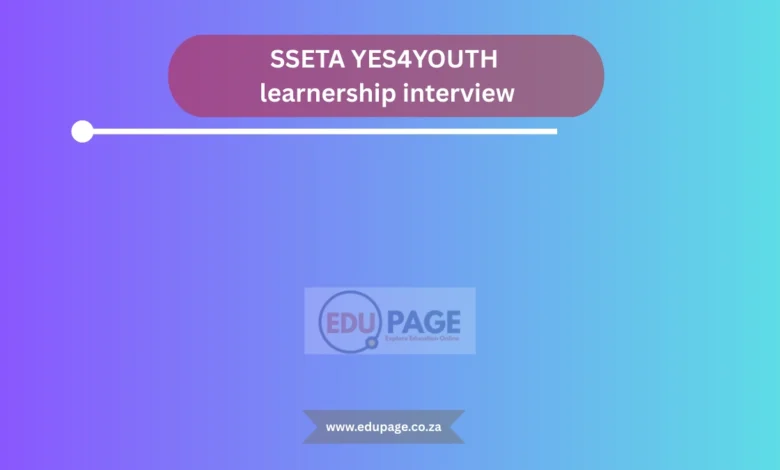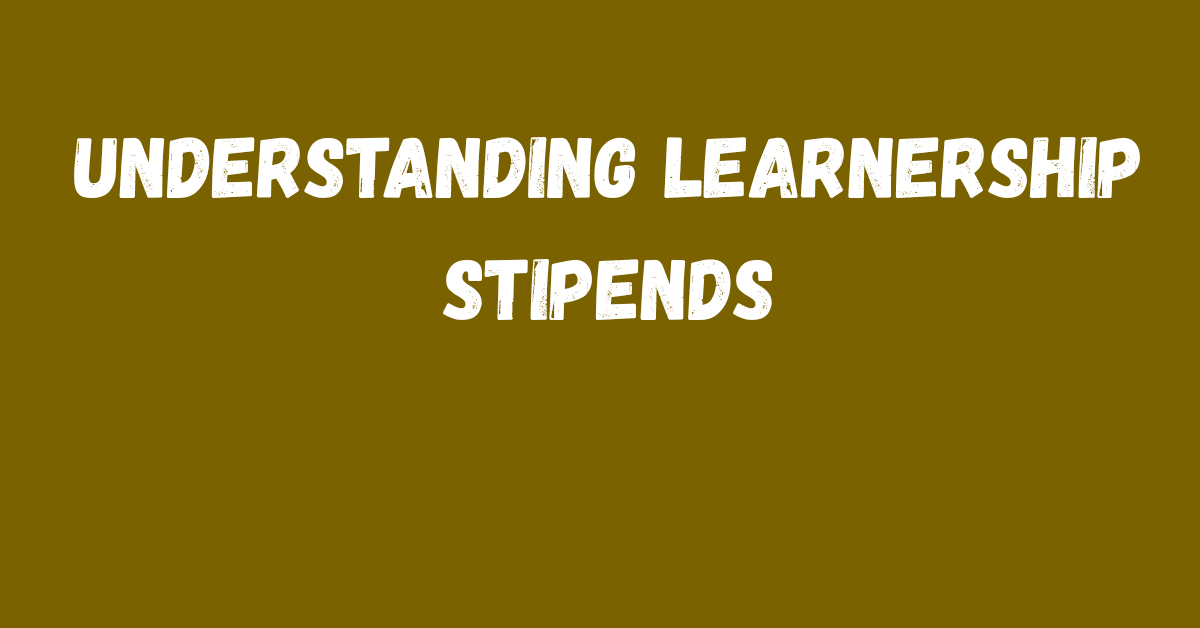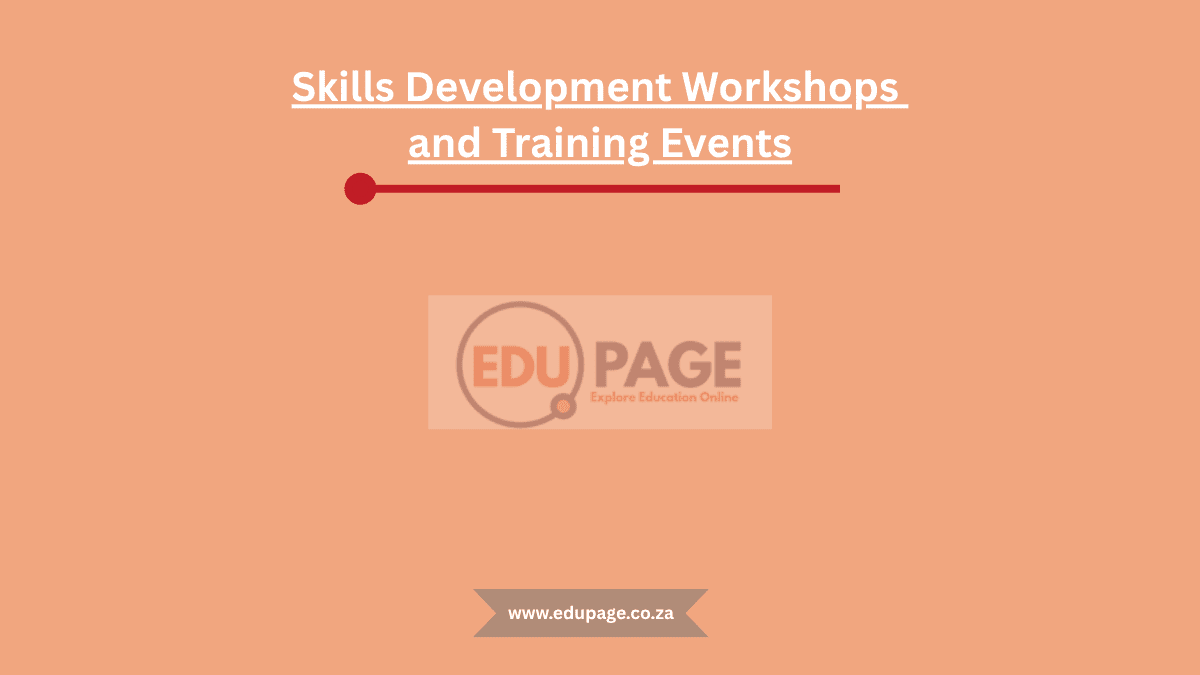Why SSETA YES4YOUTH learnership interview Matter? Questions and Expert Answers

The YES4YOUTH learnership program, powered by the SSETA, offers a vital stepping stone for young South Africans seeking to gain practical skills and valuable experience in the sector. As applications open, the competition intensifies, and understanding the interview process becomes paramount. This article will equip you with the knowledge and strategies to confidently navigate your SSETA YES4YOUTH learnership interview, transforming your aspirations into a tangible opportunity. From common questions to expert insights, prepare to shine and secure your place in this transformative program.
Securing a learnership with the SSETA YES4YOUTH initiative is more than just an interview; it’s a demonstration of your potential, your commitment, and your understanding of the broader economic landscape. Employers and program facilitators look for candidates who not only possess the basic requirements but also show initiative, a willingness to learn, and a clear vision for their future. This guide delves into the core of what interviewers are looking for, providing you with the tools to articulate your strengths and answer questions effectively, setting you apart from the applicant pool.
Understanding the SSETA YES4YOUTH Learnership Program
What is the SSETA?
The Services Sector Education and Training Authority, or SSETA, plays a big part in South Africa. It helps train people for jobs in the services sector. Think about careers in things like retail, hospitality, or even banking. The SSETA makes sure that skills development matches what companies need. Its main job is to close the skills gap across many service industries. This helps young people find work and grow their careers.
The YES4YOUTH Initiative: Goals and Objectives
The YES4YOUTH program aims to help young South Africans find work. It gives them a chance to get real work experience. This program addresses a big problem: youth unemployment. It provides a path for young people to learn on the job. Many companies and the government back this effort. They want to empower youth and boost the economy.
Benefits of the Learnership
Joining an SSETA YES4YOUTH learnership offers many good things. You gain useful, hands-on skills you can use right away. You get real experience in a workplace setting. This often opens doors to future job opportunities after the program ends. It helps you grow personally and adds to South Africa’s economy. Learnerships are a great way to start your career journey.
Common SSETA YES4YOUTH Interview Question Categories
Motivational Questions: Why This Learnership?
Interviewers want to know why you truly want this spot. They look for passion and a clear understanding of the learnership. These questions check if your goals fit the program’s offerings.
- “Why are you interested in this particular learnership?”
- Answer Tip: Connect your personal career goals with what this learnership offers. Talk about specific skills you want to learn. Show how it fits your path.
- “What do you hope to achieve from this learnership?”
- Answer Tip: Focus on learning new skills and growing in your career. Talk about becoming better at your chosen field. Emphasize how it will help you move forward.
- “What do you know about the SSETA and YES4YOUTH program?”
- Answer Tip: Show you’ve done your homework. Mention what the SSETA does and the goals of YES4YOUTH. Explain how you see yourself fitting into their mission.
Behavioral Questions: Demonstrating Competencies
These questions ask about how you acted in the past. Your past actions often show how you will act in the future. They check for important workplace skills.
- “Describe a time you had to work in a team.”
- Answer Tip: Talk about how you shared ideas and solved problems with others. Explain how you communicated well to reach a common goal.
- “Tell me about a challenge you faced and how you overcame it.”
- Answer Tip: Show your ability to think clearly under pressure. Explain how you were strong and found a way around the problem.
- “How do you handle pressure or tight deadlines?”
- Answer Tip: Give a clear example. Explain your methods for managing time or staying calm when things get tough.
Situational Questions: Problem-Solving Scenarios
These questions put you in made-up work situations. They help interviewers see how you would handle new problems.
- “If you were given a task you didn’t understand, what would you do?”
- Answer Tip: Say you would ask for help or more details. Show you’re eager to learn and will seek clarity.
- “How would you approach learning a new skill quickly?”
- Answer Tip: Talk about breaking the skill down or finding resources. Show you are resourceful and ready to learn.
- “Imagine you made a mistake at work; how would you address it?”
- Answer Tip: Explain you would own up to it and learn from the error. Describe steps you would take to fix it and prevent it again.
Skills and Knowledge-Based Questions
These questions check if you have the right skills and knowledge for the learnership. Be honest and highlight what makes you a good fit.
- “What are your strengths and weaknesses relevant to this learnership?”
- Answer Tip: Match your strengths to the learnership’s needs. When discussing a weakness, show how you are working to improve it.
- “What computer skills do you possess?”
- Answer Tip: List specific programs you can use, like Microsoft Word or Excel. Say if you are basic, good, or very good at each.
- “Describe any previous work or volunteer experience.”
- Answer Tip: Focus on skills you gained that can transfer to this learnership. Talk about achievements, even small ones.
Crafting Effective Answers: Strategies and Examples
The STAR Method for Behavioral Questions
The STAR method helps you give complete answers to behavioral questions. It structures your response into four parts: Situation, Task, Action, and Result. Use it to tell a clear story.
- Situation: Set the scene. Where and when did this happen?
- Task: What was your goal or responsibility in that situation?
- Action: What did you do to address the task or problem?
- Result: What was the outcome of your actions? What did you learn?
Example Answer Structure: “In my previous role as a volunteer at [Situation], I was tasked with organizing a community event [Task]. I decided to create a detailed plan, coordinate with other volunteers, and handle guest registrations [Action]. This resulted in a very successful event with high attendance and positive feedback from participants [Result].”
Demonstrating Enthusiasm and Proactiveness
Showing you are genuinely interested is very important. It tells the interviewer you will be a dedicated learner.
- Research the host company well. Know what they do and what their goals are.
- Ask good questions about the program and the company. This shows you’re thinking ahead.
- Clearly state your desire to learn and contribute. Let them see your eagerness.
Honesty and Self-Awareness
Being truthful and knowing yourself leaves a strong impression. It shows maturity and that you can reflect on your growth.
- It’s okay to admit if you have areas to improve. Explain how you plan to get better.
- Give real answers. Avoid responses that sound too perfect or fake.
Preparing for Your SSETA YES4YOUTH Interview
Good preparation is your secret weapon. It builds confidence and helps you stay calm.
Researching the SSETA and Host Organization
Take time to learn about both the SSETA and the company offering the learnership. The SSETA focuses on certain skills for the services sector. Understand their main goals and how they fit with the YES4YOUTH program. Also, find out about the host company’s mission and what they value. Check for any recent news about them. Knowing this helps you tailor your answers.
Understanding the Learnership Requirements and Job Description
Read the learnership description carefully. What skills do they say you need? What will you be doing each day? Break down the job ad into key skills and duties. Make a list of how your own experiences match each requirement. This helps you show why you’re a perfect fit for the role.
Practicing Common Questions and Developing Your Narrative
Practice makes perfect. Role-play the interview with a friend or family member. You can also record yourself answering questions. This helps you hear how you sound and spot areas to improve. Have a short “elevator pitch” ready about yourself. This is a quick summary of who you are and why you want the learnership.
Asking Insightful Questions: Making a Lasting Impression
Why Asking Questions is Crucial
Asking questions shows you are engaged and thinking. It proves you’re interested in more than just getting any job. This is a chance for you to see if the program is right for you, too. It makes the interview a two-way chat.
Types of Questions to Ask
Think about what you truly want to know about the learnership and the company.
- Ask about the typical day-to-day duties of someone in this learnership.
- Inquire about the training you will get and who will guide you.
- Find out what kind of job opportunities might come after the learnership.
- Example Question: “What opportunities are there for learners to gain exposure to different departments within the organization?”
Questions to Avoid
Some questions are better saved for later.
- Do not ask about salary, benefits, or holiday time during your first interview. These topics can make you seem less focused on the learning part.
Final Thoughts: Securing Your SSETA YES4YOUTH Learnership
The interview is your opportunity to showcase your potential and your genuine desire to succeed within the SSETA YES4YOUTH learnership. By understanding the program’s objectives, preparing thoroughly for common questions, and demonstrating your enthusiasm and commitment, you significantly increase your chances of selection. Remember to be confident, honest, and articulate your value proposition clearly. This learnership is a gateway to a brighter future, and with the right preparation, you can unlock that door.


